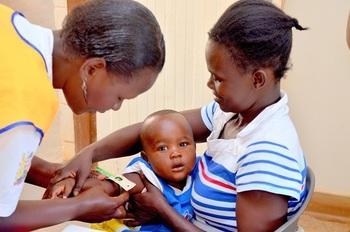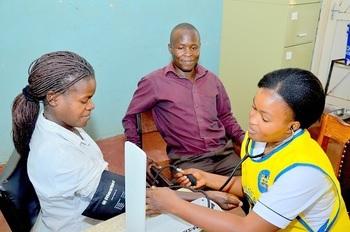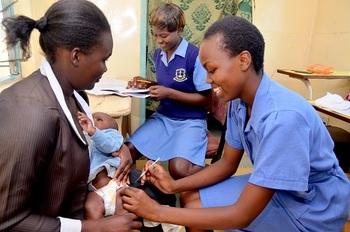Approach
The project supports partner institutions at the national level and in four counties (Kisumu, Kwale, Siaya and Vihiga) to strengthen people’s financial access to health services and to ensure the quality and reliability of those services. It is one module in a larger German-supported health sector programme which also includes financial cooperation measures implemented by the KfW Entwicklungsbank.
Health financing
More than 80 per cent of Kenyans work in the informal sector, and extending social health insurance coverage to informal sector workers and their families is therefore a key strategy for reaching universal health coverage. The project advises the National Health Insurance Fund (NHIF) at the national level on policies and strategies for increasing financial protection among informal sector workers, including on the design of group insurance contracts.
In the four target counties, the project supports County Health Management Teams (CHMT) and NHIF regional branches to identify informal groups, such as local farming cooperatives and market vendors, to sensitise their members to the principles of health insurance; and to enrol them in the NHIF via group insurance contracts. The project also works with the NHIF to improve the implementation of insurance processes, such as claims processing, financial flows and recordkeeping, by building the capacity of personnel at accredited hospitals in the four counties.
Quality management
The project seeks to mainstream nationally uniform standards for quality management into routine processes at health facilities, using IT-based approaches wherever possible. Health personnel at 47 hospitals in the four counties are mentored on quality improvement measures. Quality of care is assessed regularly using a web-based version of the Kenya Quality Model of Health (KQMH) checklist.
The project supports the establishment of quality management structures in the county administrations, in 47 hospitals in the four counties, and at the Kenyatta National Hospital in Nairobi. It also strengthens the capacity of health professionals and CHMTs to analyse and use data from the District Health Information System in health sector planning and budgeting processes.
Health sector governance
Since 2013 responsibility for health service provision has been devolved to the county level, creating opportunities to make health services more responsive to the needs of local residents. The project works with county administrations in Kisumu, Kwale, Siaya and Vihiga to strengthen health sector management and governance. It advises CHMTs on the design and implementation of annual planning processes, in line with nationally established guidelines. It also supports CHMTs to introduce instruments which promote public participation and enhance transparency and accountability in the health sector, such as service charters, complaint mechanisms, and staff and patient satisfaction surveys. To encourage replication of good practices, the project documents and shares experiences across the four counties and beyond.


